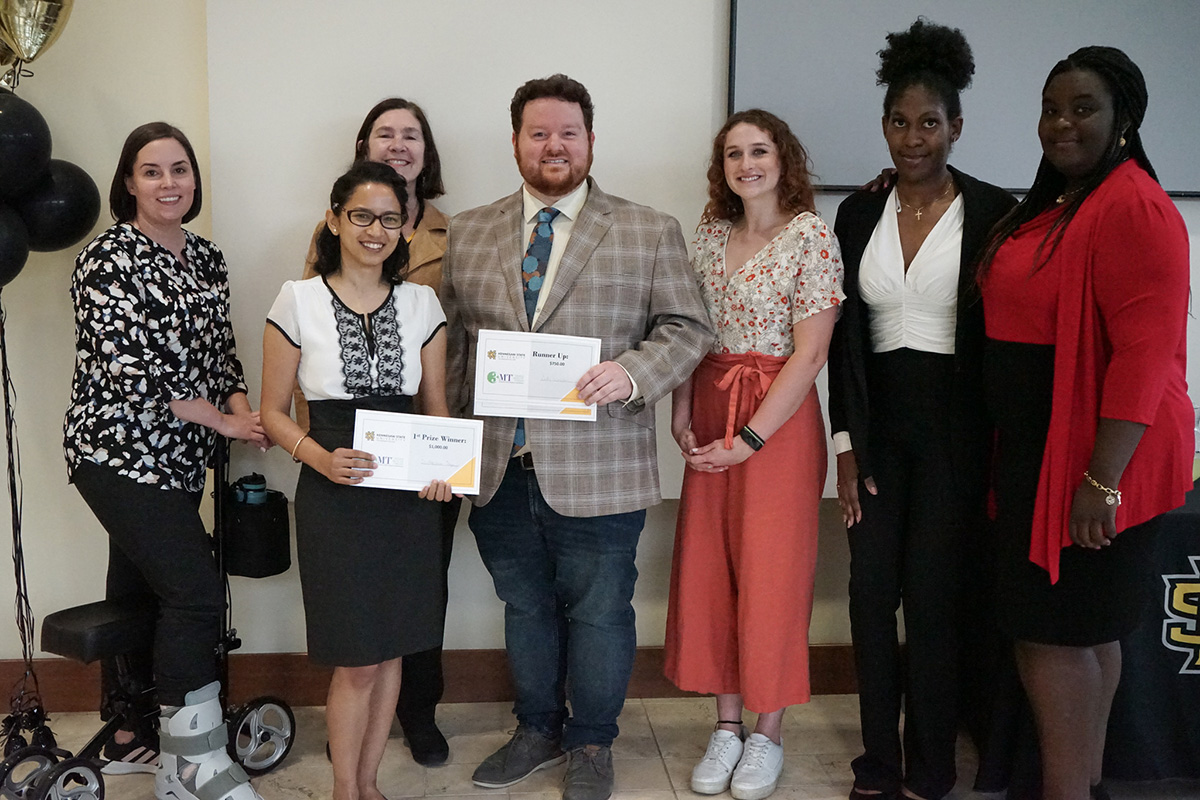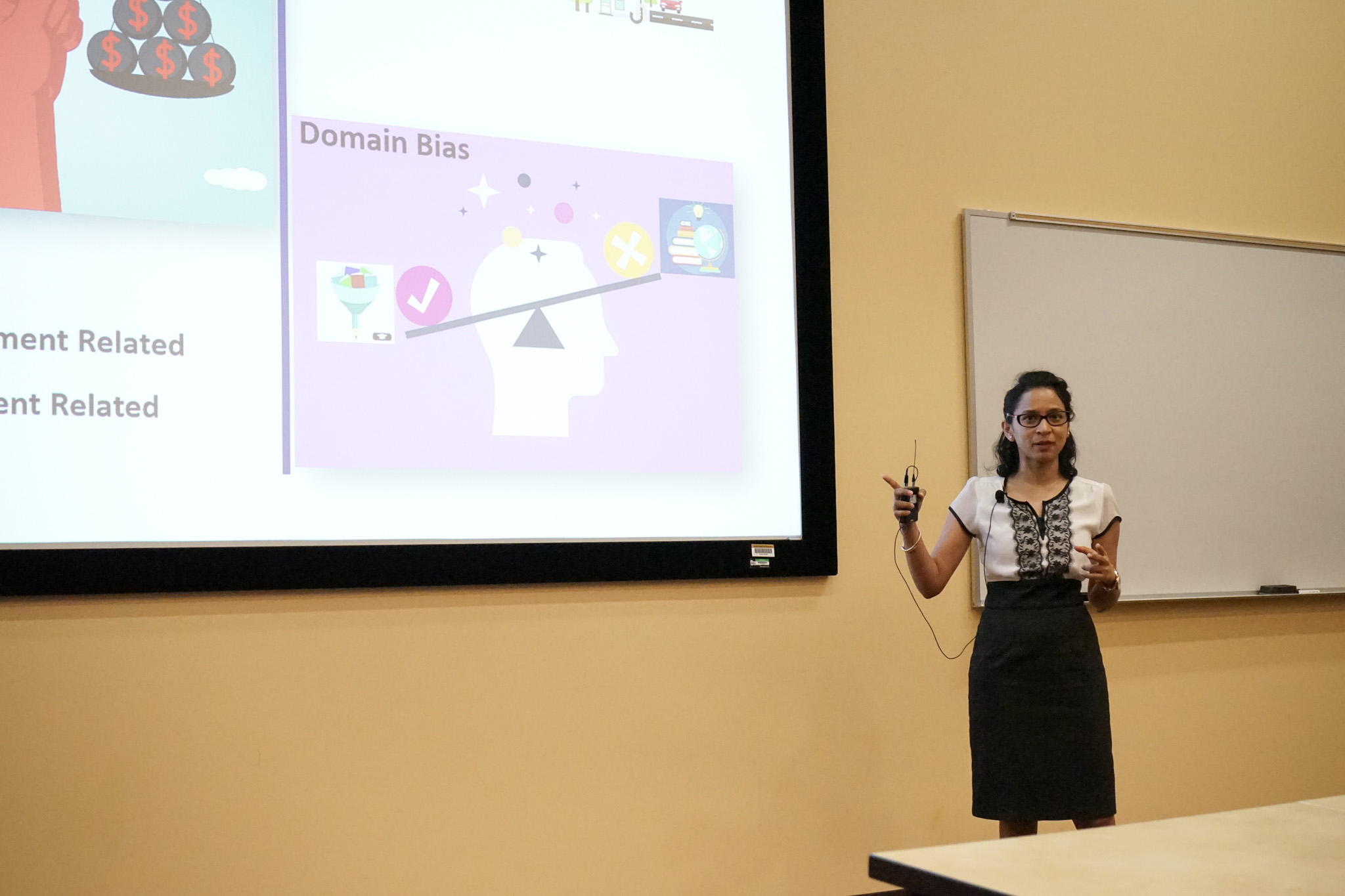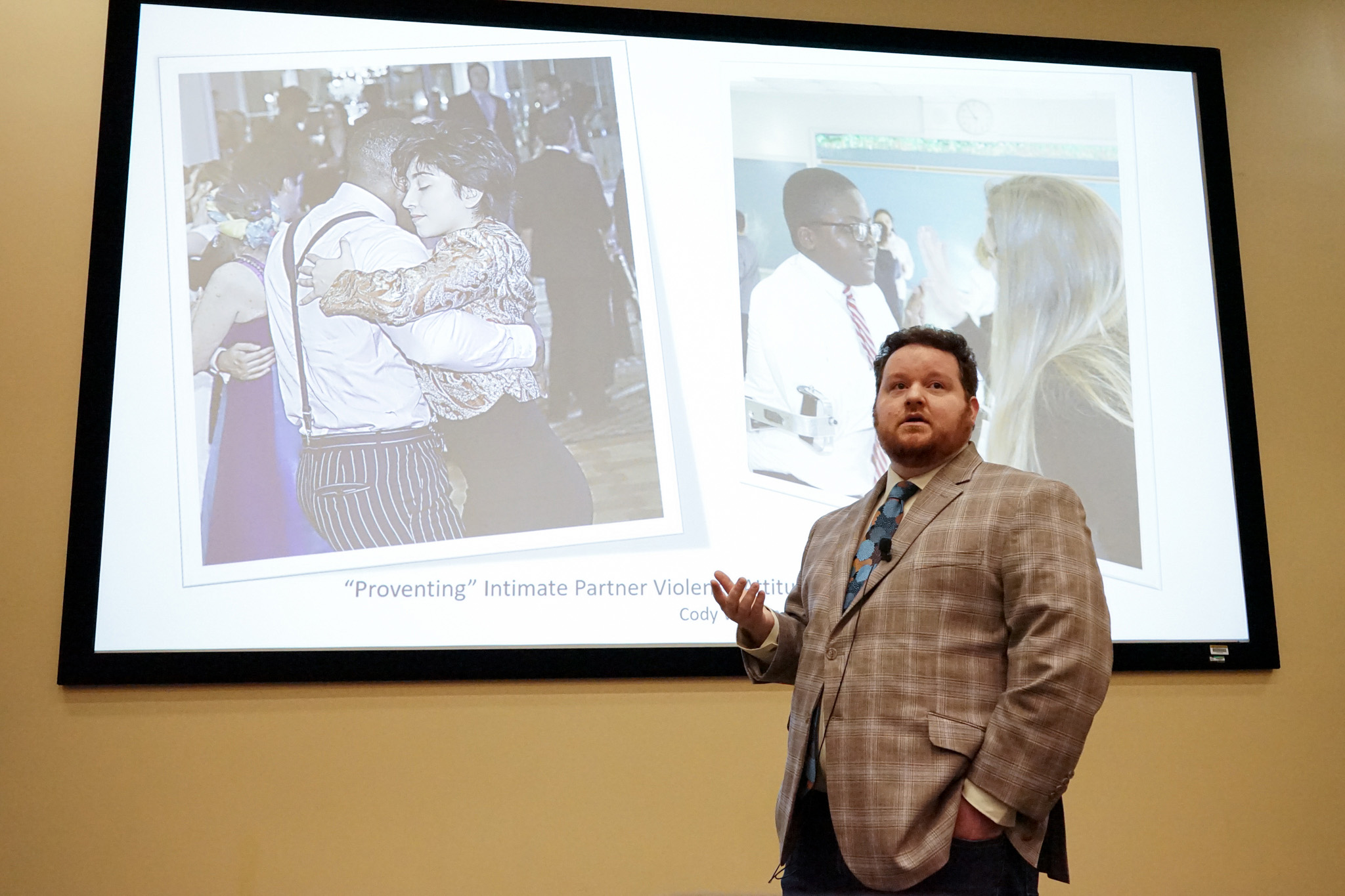Kennesaw State Graduate College hosts 3-Minute Thesis
KENNESAW, Ga. | April 10, 2023

The Kennesaw State University Graduate College hosted its 3-Minute Thesis (3MT) on Thursday, April 6, challenging master’s and doctoral students to condense their research into a three-minute oral presentation.
Sudhashree Sayenju won first place for her presentation titled, “Quantification and Mitigation of Biases in Deep NLP Models.” Cody Wehlan captured second place and the people’s choice award for his presentation titled, "’Proventing’ Intimate Partner Violence-Related Attitudes.”
Sayenju is mentored by Ramazan Aygun in the School of Data Science and Analytics, while Wehlan studies under the direction of Volker Franke in the School of Conflict Management, Peacebuilding and Development.
“We are thrilled to be able to showcase the diverse research our graduate students are engaged in,” Graduate College Dean Juliet Langman said. “The 3MT competition provides a wonderful opportunity for students to build confidence in presenting their research in straightforward and engaging ways.”
Sayenju’s presentation centered on identifying different types of biases present in AI models. She explained that her dissertation aims to quantify both good and bad biases.

Biases that are unwanted include discrimination based on gender, age or race. However, AI models also show bias through domain knowledge, which is a niche understanding of a particular industry, discipline or activity.
“Overall, by quantifying various kinds of biases, I’m trying to make sure language models are being fair and we are not enhancing discrimination within society,” Sayenju said.
Sayenju said she practiced her presentation in front of both colleagues and family members, providing ample opportunity to perfect the timing and divide her thesis into central parts.
“It wasn’t as bad or as difficult as I thought it would be,” Sayenju said. “In the beginning, I made it big in my head.”
Wehlan also found it challenging to abbreviate his research, which examines how effective partner dance is to preventing intimate partner violence-related attitudes.
“I’m prone to the nitty-gritty details, which as I’m preparing for my dissertation defense later this month, that’s an appropriate place for it,” Wehlan said. “But I kept reminding myself, ‘How would I explain this to someone without a research background and how many words can I use with three or more syllables?’”
Wehlan dedicated the first 30 seconds of his presentation to asking the audience to reflect on what they desire in a partnership — sharing a mutual trust, knowing that personal boundaries are clear and respected, knowing that you can be vulnerable.
He explained that research indicates partnerships that do not have that mutual respect could be at a greater risk for intimate partner violence.
In aiming to prevent those instances of intimate partner violence, Wehlan considered his own background in dance and wondered whether dance could be an effective tool in allowing people to practice communication skills and realize their impact on others.

Wehlan surveyed 275 alumni of a studio based in New York City called Dancing Classrooms that offers a 10-week class in partner dancing to children in fifth through eighth grade, ultimately finding that the participants believed the program had a positive impact on their social skills.
“I feel grateful that folks seemed to resonate with that, because at the end of the day it’s all about creating those feel-good connections and making sure everyone — especially in intimate relationships — can feel seen and connected and also have fun as we do it,” Wehlan said. “Dance has done it for me, and it seems like other people like to get their groove on, too.”
Sayenju was awarded $1,000 for her first-place presentation, while Wehlan earned $750 for second place and an additional $350 for winning the people’s choice award.
Director of Undergraduate Research Amy Buddie, Interim Vice President for Research Tyler Reinagel, and Office of University Development Grants & Contracts Writer Alyssa Gulledge judged the competition.
“It was a really great experience, not only for my defense but for post-graduation employment,” Wehlan said. “It’s a great opportunity to work out that elevator pitch and how to say things in a very generalized way that is still giving a message.”
— By David Roberts
3-Minute Thesis (3MT) participants
Jordyn Upton, Master’s of Integrative Biology; Faculty advisor: Christopher Cornelison
Microbial Commensals of Tri-Colored Bats in Georgia and their Relationship to WNS
Susceptibility
Sudhashree Sayenju, PhD in Analytics & Data Science; Faculty advisor: Ramazan Aygun
Quantification and Mitigation of Biases in Deep NLP Models
Priscilla Adebayo, PhD in International Conflict Management; Faculty advisor: Volker
Franke
Enhancing Women’s Resilience and Capacity Development in Post Conflict Liberia: A
‘Meaning Focused Future’ Framework
Cody Wehlan, PhD in Conflict Management; Faculty advisor: Volker Franke
"Proventing" Intimate Partner Violence-Related Attitudes
Lora Asberry, Master’s of Integrative Biology; Faculty advisor: Troy Mutchler
Early-Stage or Curable Cancer Diagnosis in Minorities: A Journey of Survivors
Stephanie Stapleton, PhD Conflict Management; Faculty advisor: Maia Hallward
The End of Arms Control? Examining Shifting US Participation in Nuclear Agreements
from 1959-2021











